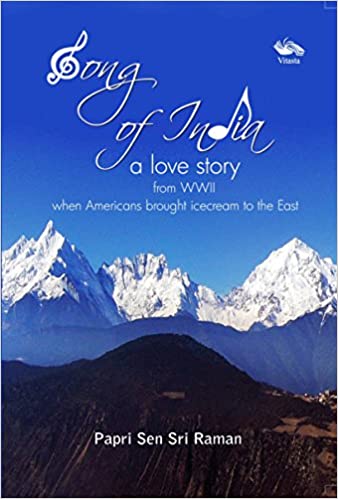Music, as in the case of Love, belongs to those who revel in it. The lyrics may differ. The musical instruments used may sound alien even. But the basic flow and the vital power of Music is Universal. Titled, Song of India, Papri Sen Sri Raman’s book highlights precisely this fact. There is certainly a lot of ‘Indianness’ in the book. The theme song is a paean to particulars of this country. Yet, the musicality which is ever present like the soothing steadiness of a tanpura, which controls the whole concert, with its gentle steadfastness shows that there are no groups or strangers to music. It is music which is omnipotent. People are distant auxiliaries to it.
It is only when the people actively worship music, that the very notes they sing, or play elevates them to Divinity. Like rain for the summer-parched Earth, music is a benediction which comes out from a rarefied place and through the practitioner, spreads like a blessing throughout.
There are two very different stories deftly linked to this theme of devotion to music. One is an in-depth look at the way spirituality played a role in the politics of this country at that time in the 1940s. India was a paradise for mendicants. Clad in ochre robes, people had the cloak of invincibility. It took the British overlords a lot of time and effort to identify those seeking freedom from colonial rule amid the sea of sages, who had absolute ease of movement in society.
The fortunes of the Bengali house, with all its customs are delightfully narrated. Manik, the dead freedom fighter-suicide soldier is a living presence in the book. The extended family, the retainers all love him. For them Manik can never be dead.
Like Music, Love too sets its own course. The truths of Love do not cater to those of politesociety. When love happens in The Song of India, it does with the intensity of the floods in the Brahmaputra, the only ‘male’ river in India.
The warm-hearted American, who is part of the extremely dangerous mission of flying over the Himalayan mountains, termed ‘The Hump’, fits seamlessly with Manik. They are essentially different. Yet love of Music, capability on different instruments and a deep and abiding fondness for the family binds him to them. He is given a prominent position there.
The terror of war is a controlled backdrop to this book. At times, the narrative charms you to look at the story of the human beings caught up at that period of time. Then suddenly, harshly, the War comes up as a terrible and harsh reality. People are being killed; cultures destroyed. Just as effortlessly, the story meanders back to the Ashrams on the bank of the now docile Brahmaputra. It is a mark of the author’s command over the art of storytelling that this wonderful little book takes you on a cruise through a river of happenings where the tabla and the drone of war planes make their own unique harmony.
For any reader interested in India, the War, narratives of people caught and linked with society, conventions, and most of all Music, Papri Sen Sri Raman’s The Song of India is a veritable feast of nuances, too subtle for most readers.

